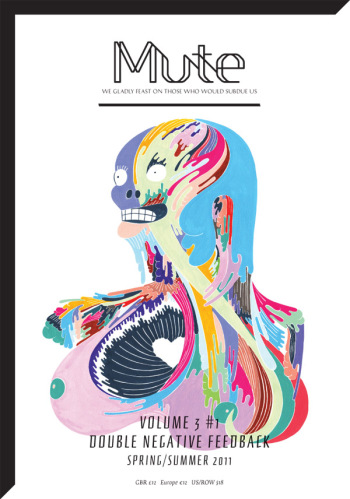Virtueel Platform: Sectoranalyse E-cultuur (2011) [Dutch]
Filed under report | Tags: · copyright, creative industries, cultural politics, digital art, digital culture, innovation, intellectual property, knowledge economy, mobile technology, netherlands, new media art, web 2.0

Nieuwe kunstsector een feit: 400 miljoen euro jaaromzet voor Nederlandse digitale kunst en cultuur.
De Nederlandse digitale kunstsector heeft een jaaromzet van 400 miljoen euro en geeft werk aan ruim 10.000 mensen. Dit blijkt uit de ‘Sectoranalyse E-cultuur’ van Virtueel Platform die maandag 18 juli 2011 uitkomt. Het onderzoek werd uitgevoerd door bureau Veldkamp / TNS NIPO.
De sectoranalyse laat voor het eerst de omvang en karakteristieken zien van de relatief jonge maar snelgroeiende e-cultuursector. Een innovatieve sector die bestaat uit medialabs, kunstenaars, gamebedrijven, festivals, presentatieplekken en media- en kunstopleidingen.
In het rapport zijn vijftien Best Practice, goede voorbeelden van e-cultuur, te vinden.
Trends
Uit het onderzoek blijkt verder dat organisaties sociale media (74%) de meest belangrijke ontwikkeling van het moment vinden, op de tweede plaats komt mobiele technologie (47%). Een struikelblok blijkt onduidelijkheid over auteursrecht, waar 37% van de ondervraagden graag betere oplossingen voor ziet. Websites, interactieve installaties, mobiele media en apps en games met een educatieve of culturele toepassing zijn belangrijke producten.
Innovatieve sector
Directeur Floor van Spaendonck: “Het is nu een feit: het onderzoek bevestigt met cijfers dat e-cultuur een eigen sector is binnen de kunst, met opleidingen, producenten en afnemers. In deze sector vinden unieke experimenten met kunst en nieuwe media plaats. Daarom is het zaak dat de overheid met een stevig e-cultuurprogramma deze ontwikkeling en onderzoek blijft stimuleren. Het werk van medialabs als Mediamatic, Waag, V2_ en andere pioniers draagt wezenlijk bij aan inhoudelijke reflectie en verdieping van de kennismaatschappij”.
Publisher: Virtueel Platform, Amsterdam, July 2011
36 pages
Published under Creative Commons BY-NC
PDF (no OCR)
Comment (0)Mute, 3(1): Double Negative Feedback (2011)
Filed under magazine | Tags: · architecture, art, capitalism, contemporary art, cultural politics, economics, financial crisis, journalism, music, neoliberalism, networks, politics, uk, wikileaks

“‘Double Negative Feedback’ expresses the hope that the chaos unleashed by the cybernetic loops of financialisation, post-Fordist production and networked life might not only be entropic and exploitative. The noise generated by ‘positive feedback’ also takes the form of the explosions we are seeing in the Arab world, the anti-disciplinary uses of cybernetic control systems, the ‘shared precarity’ of compositional improvising, and the ripples of a political organising that no longer assumes a common identity but instead acknowledges our common vulnerability. This issue scouts out such double-negative loops in a landscape dominated by the relentless, if often misfiring attempt to put feedback to work.”
Edited by Josephine Berry Slater
Publisher Mute, London, June 2011
Edward Larkey (ed.): A Sound Legacy? Music and Politics in East Germany (2000)
Filed under book | Tags: · cultural politics, east germany, germany, music, music history, politics

Collection of papers from a one-day workshop organized by Edward Larkey under the title “A Sound Legacy? Music and Politics in East Germany” at AICGS on December 3, 1999.
The volume brings together practitioners as well as music historians in an effort to reflect upon the development of music culture in preunification East Germany, and to provide a background perspective for aspects of music culture in the postunification period.
Published by American Institute for Contemporary German Studies, 2000
Harry & Helen Gray Humanities Program Series, Volume 8
ISBN 0-941441-53-9
74 pages

